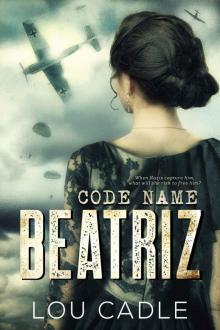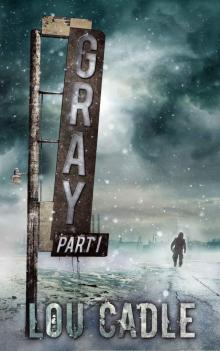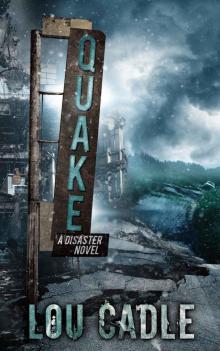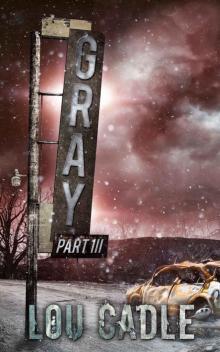Code Name- Beatriz Read online
Page 2
“Some of it. It’s all real,” Miss Atkins said.
“That’s good,” Antonia said, fingering the bank notes. They felt real, though her training in forgeries had been brief, and she was no expert. She wasn’t one to trust easily, but here she had to trust the experts in the SOE not to make fatal mistakes. She did trust them.
“We’re dropping a packet of more banknotes with you, along with small arms and explosives. For your circuit.”
“Should I do something with them?”
“Those in France will know what to do. They may hide them tonight and retrieve them later. The primary mission is to get you safe and hidden as quickly as they can. And that is your only mission for this night, to ascertain that those greeting you are of Cooper, and to get yourself safe. Tomorrow is soon enough to begin your work.”
Antonia nodded. She was feeling the nerves more with every instruction. This was no longer practice, no longer theory. She was to be dropped into France this very night, and then she would be in danger every moment until—until she wasn’t. An urge to swallow was irresistible, and she had to fight herself to not do it several times in a row. Nerves. She took up the equipment. There was also a small first aid kit. Glancing inside, she saw there were appropriate French items in it, sticking plasters, and German aspirin tablets.
Miss Atkins switched to French. “Forget English if you can. If you jam your toe against a brick, curse in French. If you are startled, don’t let out one single word of English. Or Spanish, for that matter.”
“Agreed,” she said, in French.
Miss Atkins reached into a pocket and pulled out a necklace. Hanging on a chain was a cheap locket. She thumbed it open to show her the blue tablet inside. “Your L-pill.” She snapped the lock shut.
Cyanide, the suicide pill. Antonia held her hand out and took it. “Should I put it on?”
“Zip it in your pocket for the jump. But yes, when you land, put it on and do not take it off. You are never safe, not even in bed.”
“I won’t hesitate to use it,” she said.
“Don’t rush to,” Miss Atkins said. “But don’t delay too long. We have reason to believe the Gestapo has learned to search agents for them within minutes of capture.”
“I understand,” she said.
“Your salary will be taken care of.”
Antonia couldn’t manage to think of anything she cared about less. “Thank you,” she said.
Miss Atkins opened the outer door for a moment and leaned out. She must have signaled someone, for distantly, the noise of a plane engine began to rise. She stepped back inside. “Courage,” she said. “And good luck.”
“Merci,” Antonia said. She hefted the wireless suitcase. It was heavy.
She shook Miss Atkins’s hand at the edge of the runway and walked alone to the plane. She was helped aboard, and to her surprise, the man who helped her followed her through the cargo door, closing the door after himself. He reached for the wireless case, and Antonia did not let go for a moment. The case represented her worst danger but her whole reason for going on the assignment. She would not let it out of her sight unless she knew it was safe. He leaned forward and shouted into her ear. “It goes into a cylinder we drop.”
Of course. She could not simply hold to the handle of the heavy thing while parachuting. Her fingers let go. He packed her clothing valise into a dark brown backpack and helped her get it secured over her shoulders. Then he strapped on the parachute. Together, the weight felt to be about forty pounds. In training, she had been made to run every day with fifty pounds on her back and jump with only half that weight. This would be a new experience, jumping out of a plane with such a heavy burden.
She hoped she would not fall awkwardly and be crushed before her work began. That would be foolish.
The man gave her an informal salute and strapped himself in at the rear of the plane. She sat behind the pilot—it was the only other seat—and craned her neck to watch him finish checking his instruments. Then he flicked off the light he had been using, and the cockpit grew dark. She felt the vibration of the airplane’s engines in her legs and bottom. In the dark, she grew aware of the thin barrier between her and the black world outside, the windscreen that seemed so insubstantial that she could pierce it with her sleeve dagger. Her pack on her back made it impossible to get comfortable. She wondered why she could not wait to put it on, and then she realized that something could go wrong long before France, and the parachute might save her.
“Calm winds,” the pilot yelled back at her. “Lucky for you.”
Then the plane taxied, and the noise increased. The front wheel lifted.
At some point, over an ocean invisible on this moonless night, the plane passed out of Allied territory. She had entered the land of the enemy.
Chapter 4
“Fog,” the pilot yelled. He had said fewer than ten words in two hours. The steward or co-pilot or whatever he was in the back had somehow fallen asleep despite the cold and noise, but he stirred again at the shout.
She couldn’t make out the fog through the windscreen, but she trusted that the pilot knew his business. A few minutes later, the other man tapped her on the arm and pointed back, her signal to ready herself for leaving the plane. He turned on a dim red light to work by.
She checked her own pack and straps, and he checked them as well, and then he handed her down a ladder into the drop tank, where two boxes and the cylinder containing her radio awaited. The copilot dropped to his belly in the plane and yelled down at her, “Kick the packages out and jump immediately.”
Antonia made the “okay” sign back up at him. She’d practiced doing this many times. She had to act quickly, so that she didn’t leave equipment scattered all over the French countryside and herself a mile distant.
He rolled away but was back in a moment, flashing all his fingers three times. Thirty seconds.
Making sure the other packages to be dropped were right against the lip of the door, she reached down for the handle that released the tank door. They’d be coming in low, to avoid detection, so she had to deploy her parachute quickly. Not so quickly it’d hit the belly of the plane, of course, but she had no extra seconds to waste.
The dim red light was turned off. The tap on the head told her to go. She yanked the door open, kicked the equipment out, and stepped into air. The sound of the engine moving away told her it was safe to pull the cord. The parachute deployed over her head, sounding like a hundred pigeons taking off at once, then silence returned, and she felt a damp wisp of fog brush her face like the memory of a lover’s caress.
She hit the ground before she expected. Landing more flat-footed than she should have, she felt the impact in her ankles and hips, but she recovered in an instant and bent her legs, fell, tucked her arms at the same time, and soon rolled to a stop. She leapt to her feet and shrugged off the chute.
The fog was thick. A white face appearing out of it startled her, floating, as if unattached to a body. But it was only a man, middle-aged, in clothes so dark they hid him well.
“Wireless operator, from England?” he said.
“Yes.”
“Cooper here. No talking. Come.”
She had expected more of an authentication. He knew the circuit name. Was that enough proof he was who she hoped he was?
If he wasn’t in Cooper, if he was working for the Nazis, if they had captured all of Cooper and tortured them for that name, she would be led to prison only minutes after arriving. She had thought she was willing to die here, but she was not willing to die so quickly.
But what else was there to do? If she ran from him, and he was her contact, she could run into a German patrol instead and put him at risk. Or he might think she was a spy and shoot her as she fled.
She turned, thinking to gather her parachute in order to bury it, as she had been taught, but it had been gathered up already by a slight teenaged boy whose longish blond hair was visible even in the foggy night.
The man who had gr
eeted her grabbed her shoulder, giving it an insistent tug, and she turned and followed him. He did not run, but he walked quickly, with long-legged strides, until they were under the deeper darkness of a patch of trees. There he stopped and whispered to her. “The others will get the packages. They will bring the wireless to us.”
She had seen only the one other, the boy. If there was a larger crew working here, they were stealthy indeed. She nodded. His head was so close to hers she knew he could feel it.
“Bicycles,” he whispered, and again he tugged at her sleeve.
She stumbled over roots or rocks twice, and once a low-hanging branch snatched at her pack. When she pulled at it, the branch snapped with a sound that seemed loud as a rifle shot. Her heart was in her throat as they went on. Had anyone heard it?
It seemed not, for no one yelled a challenge.
Not a brightness but a blackness less total just ahead told her the trees were thinning. The man held up an arm to halt her, which she discovered only when her shoulder ran into it. Then he moved forward alone into the dim starlight. He looked one way, then another. He came back to her and hissed for silence with a sound hardly louder than her own breathing.
As she crept forward, he retrieved a bicycle hidden amongst the trees, holding it upright until she reached his side. A basket on the back wasn’t large enough to take her pack, so she left it on and held the bicycle as he had. It was heavier than she expected, an old one. He joined her a minute or two later with another bike and the wireless case, which someone on his team must have brought him. They were quiet and efficient.
He put the case in the basket of his own bicycle, communicating without his saying a word his urge for her to hurry. He mounted and began pedaling, and so she mounted her own bicycle and followed him, taking a second to find her balance with the extra weight on her back. The grinding of tires on grit was the only sound she heard for long minutes. They rode in and out of patches of fog, and once it was so thick she lost sight of him for a few strange seconds, leaving her feeling as if she was not pedaling in the world but through some mysterious ether. She pedaled harder, hit a rock in the road, and almost lost her balance. The weight on her back didn’t help make righting herself any easier, but she managed.
The fog thinned, and after what might have been twenty minutes of riding, he pulled up to a big building. It took her a moment to catch a faint whiff of manure and recognize the place as a barn. Walking, he took his bike around the back and she followed. He slid open a heavy door and said, “Bike goes inside.”
When he followed her and the door shut, the blackness was total. She felt another stab of fear, coming with the image of a light snapping on and the barn being filled with uniformed Nazis. The image grew more and more real and when, a minute later, a bright light did come on, she started and lost hold of the bike. It tumbled to the floor with a muted clatter.
“Careful,” he said. “Bicycles are rare. We need every one.”
The light, not a bright spotlight as her fear had at first made it, was the yellow light of a lantern, seeping from a doorless horse stall.
A sleepy chicken made a querulous sound from a dim corner. It was a barn, just a barn. No Nazis at all. The smell of manure was faint, old. There had been a cow in here once upon a time, or a horse, but not recently. “Does this farm belong to someone in the Résistance?” she said.
“A distant relative, an old woman. She takes a sleeping potion so won’t know we are here.” He looked her up and down. “You have grass on you still.”
She didn’t care but brushed at herself nonetheless. “Your name?”
“Call me Claude.”
The code name of the leader of Cooper cell, as she had been told. Her confidence rose that she was in the right hands. “Do you have anything vital to communicate to F Section now?”
“Yes, but you shouldn’t broadcast from here. Of course you understand that.”
“I understand.” He wanted to keep this a safe space, or to keep his relative safe. Fifteen minutes of broadcasting on a country road, and the Gestapo might triangulate on her signal. Even if they only knew within a thousand yards where the wireless signal had emanated from, that would, along a sparsely populated road, lead them to her. Better to transmit from a city.
“We have a mission in the planning stage, and we have some news about Monk.”
Another circuit. She knew little about it except what she had read in the mission dossier, that it was operating south of here.
“When can I broadcast?”
“Tomorrow night. We’ll move again before dawn. For now, take off your pack. Rest.” He returned to the stall with the lamp and she followed. The lamp was sitting on an overturned wooden crate, much of its light blocked by the stall’s walls. He leaned over and picked something up then turned to her.
Again she tensed, her body assuming the worst, but he only held a dark bottle of wine.
“I don’t want to drink,” she said. She wanted her mind to be clear for transmitting should the chance come before dawn to send a signal.
“Alas, it is not wine but water.” He uncorked it and drank, then carried it over. “Take off your pack. It’s heavy, I imagine.”
Finally, she did. It was a relief to lay it aside. She took a sip of the water and handed back the bottle, and then she massaged her shoulders where the straps had dug in.
“Tell me about your cover identity.”
Of course he wouldn’t know. With their wireless operator gone, it was hard to get information to Claude’s circuit. She was lucky the message about her arrival time had made it through, and sent a mental thank-you to whatever courier had brought them the news. She gave him a summary of who she was supposed to be in France.
“Will you need to meet with this businessman?”
“No.”
“What if he needs to identify you by sight?”
“That would mean I was being detained. Do people get released once that happens? Ever?”
“Rarely.”
“He knows he is to confirm I am his secretary. Whether he does this or not?” She shrugged.
“It is good that you understand that not everyone can be trusted.”
She said, “I can trust you, can I not?”
“If I am tortured? Possibly no.”
She liked him for that, an honest self-assessment. No bravado. Men who promised heroism either failed miserably at it or, if they succeeded, died of it. “One hopes that you will never discover this about yourself,” she said.
“Your French is adequate.”
She had spoken French for hours every day, and had been taught modern slang to bring her up to date. “Do I have an accent? The ‘r?’”
“No, the cadence. Your French is not quite native, no? But it is not English either.”
She did not tell him anything more about her. “I’ll be more careful.”
“It is too easy to let down one’s guard. But there are worse accents to have these days, certainly, than yours.”
“It is not part of my cover identity’s background, so I should disguise it.”
“More water?”
“Thank you, no.”
“If you need to relieve yourself, I’m afraid I have nothing better to offer than to go outside the barn.”
Antonia realized that was a useful skill for an agent, doing that neatly and quickly, even in tights and a skirt in an urban setting, and yet they had not taught it in the SOE. Perhaps they should, in Scotland. If she ever saw Miss Atkins again, she’d mention the idea.
The door opened, startling her. The blond boy slipped in. In a light voice he said, “The parachute is buried. Francois has taken the other packages with him.”
“Genevieve, this is Beatriz.”
Only with the introduction did Antonia realize the blond boy was actually a girl. Not sixteen yet, flat-chested, with hair too long for a boy but short for a girl, she could pass for a boy except perhaps the voice.
“Don’t get killed like the other one di
d,” the girl said to her. Then she left.
“You must excuse Genevieve. She took your predecessor’s death hard.”
“I’m sure you all did.”
“Genevieve is a strange girl, made stranger, I think, by the war.”
“She is part of your cell?”
“Yes.”
“And her parents know this?”
“Her father is dead. Her mother is often gone. Men,” he said, as if that was explanation enough. “And with her lack of height, she can pass for younger. This is sometimes useful to us.”
“Or she can pass for a boy,” she said. “I thought she was, at first.”
“Yes,” he said. “Get some rest if you wish. There is straw in this stall to lie on.” He pointed. “I’ll wake you when it is time.”
“I don’t know if I can sleep.”
“You’re safe here—or as safe as you can be. One thing you’ll learn that they cannot teach you in England is that when safety comes, and the night, both together, you should seize sleep when you can. It may not happen often.” He turned down the lantern so that the light was no more than a narrow candle’s worth and lifted it to take with him.
She was inclined to stay up, to try and get to know him better, to ask about their plans for upcoming operations. What would she have to report to England otherwise? “Arrived.” Not worth the danger of transmitting. Her first message to them would imply the arrival, yes?
For now, she took his advice, and carried her valise and radio into the stall he’d indicated. The straw poked her. She used her pack as a pillow and loosened the laces on her boots but tied the laces again, so she’d be ready to run if need be. She lay there, the light went out, and she heard the barn door open and close again, heard the same hen, or another, make a sleepy sound. She closed her eyes and tried to relax. But sleep would not come.
Two or three hours later, she had just started to doze when door opened again. It was well oiled, so there was no squeak of hinges, but the bottom of it brushed the barn’s floor, scraping along the dirt. She went on alert, reaching across for the sleeve dagger to make sure it was there.

 Code Name- Beatriz
Code Name- Beatriz Oil Apocalypse Collection
Oil Apocalypse Collection A Dawn of Mammals Collection
A Dawn of Mammals Collection Killer Pack (Dawn of Mammals Book 4)
Killer Pack (Dawn of Mammals Book 4) Bled Dry
Bled Dry Gray (Book 1)
Gray (Book 1) Dawn of Mammals (Book 4): Killer Pack
Dawn of Mammals (Book 4): Killer Pack Bleeding (Oil Apocalypse Book 2)
Bleeding (Oil Apocalypse Book 2) Dawn of Mammals (Book 5): Mammoth
Dawn of Mammals (Book 5): Mammoth Saber Tooth (Dawn of Mammals Book 1)
Saber Tooth (Dawn of Mammals Book 1) Natural Disaster (Book 2): Quake
Natural Disaster (Book 2): Quake Hell Pig (Dawn of Mammals Book 3)
Hell Pig (Dawn of Mammals Book 3) Bled Dry (Oil Apocalypse Book 3)
Bled Dry (Oil Apocalypse Book 3) Desolated
Desolated Parched
Parched Natural Disaster (Book 3): Storm
Natural Disaster (Book 3): Storm Natural Disaster (Book 1): Erupt
Natural Disaster (Book 1): Erupt Slashed (Oil Apocalypse Book 1)
Slashed (Oil Apocalypse Book 1) Mammoth (Dawn of Mammals Book 5)
Mammoth (Dawn of Mammals Book 5) Gray (Book 3)
Gray (Book 3)